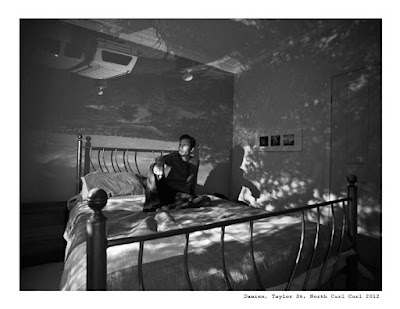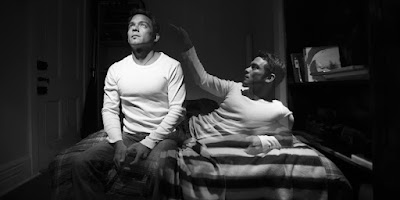Far From Heaven was created as a homage to 1950s Hollywood melodramas, cinematographer Edward Lachman was nominated for an Oscar for this film.
A still frame of bright red-orange leaves fills the screen as the title sequence begins. As the camera pans slowly over the block the leaves gradually turn brown. By the end of the block the leaves disappear completely and the trees are left bare. In less than sixty seconds, in pure visual language, we have just seen a perfect synopsis of the story.
A still frame of bright red-orange leaves fills the screen as the title sequence begins. As the camera pans slowly over the block the leaves gradually turn brown. By the end of the block the leaves disappear completely and the trees are left bare. In less than sixty seconds, in pure visual language, we have just seen a perfect synopsis of the story.
Kathy's street is full of beautiful warm colours. A bit over saturated in fact, as if they were trying too hard to be perfect. Kathy's best friend arrives in a pastel pink two tone sedan. They have to discuss a party they are hosting soon. These are very busy women living in a perfect pastel world where everything is in its place. Or so it seems. Later that night the phone rings. It’s the police department, Kathy's husband Frank has been arrested. The way the director Todd Haynes introduces Frank says everything about his character. He is giving his back to the camera, facing a lime green wall.
Frank's world is represented as a distortion of nature's primary colours. His world is full of lime greens, magentas and secondary colours. When Kathy goes to the Police Station to pick up Frank you can see she doesn't belong there. Lime green is all over the place. Even his workplace has this lime green tint. It’s obvious now that he represents almost the opposite of what Kathy is. One night after work, he sees two men laughing on the street and decides to follow them. They walk through a dark alley. Frank hesitates but with caution decides to continue. This is a decisive moment for him, director Todd Haynes decides to use a tilt angle to reinforce this feeling. He is giving us a clue that something wrong is about to happen. Something is not right, something is crooked, like Frank.
In the 50s, homosexuality was considered an aberration. That’s the reason that Lachman uses colours that are not pleasant to the eye. When Kathy catches Frank one night with another man we see again the same tilt angle, only this time we see Kathy running away. They try hard to save the relationship but we can see more and more cold blue and purple entering Kathy's world. She can only find some glimpses of happiness in her sporadically chats with Raymond, the colour gardener that works for the family. Raymond is everything Frank is not in many ways. He's always represented by earthy colours. However we see a similar green atmosphere when Kathy goes with Raymond to a restaurant, indicating that a married white wife going with her black gardener to a restaurant isn't well seen either.
"Far from Heaven takes place over different seasons, which are a metaphor for what’s happening to the characters emotionally. To suggest the emotional arc of the story, as the seasons changed, the night becomes an emotional texture for Frank and Kathy’s world coming apart. The fall night is more of purplish blue in transition to winter. As their relationship disintegrates and winter comes, it became more of a greenish blue, more of an acerbic night depicting the character’s isolation. As spring begins, the light becomes a purplish blue once more. It is a new beginning" Edward Lachman
So much to see and analyse on this film, so many different readings that is impossible to summarise. I'll finish it with another quote from Edward Lachman "The surface beauty of the characters’ world becomes its betrayal. It’s a beauty that they can never be part of. Ironically, they are seduced by what keeps them from their desire. The beauty points to something it denies. Kathy is always moving through all these different worlds in her picture-perfect environment, but somehow never obtaining the emotional stability of what middle class life is supposed to reward you with"














































